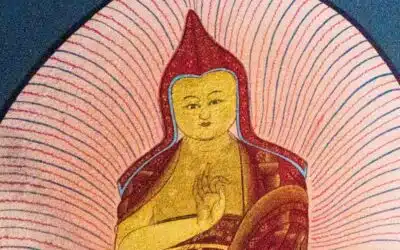Advice for Difficult Times

Written By Johanne Bernard
Blog | Culture and tradition | History of Dzogchen | Reflections on life
In this article “Advice for Difficult Times”, Johanne talks about Yeshe Tsogyäl’s difficult and extraordinary journey and the enlightened advice Padmasambhava gave her.
Series: Difficult conditions in Dzogchen
Advice for Difficult Times
In the footsteps of Yeshe Tsogyal
“As my parents, King and Queen, you were careless
And I, your indispensable princess,
Was charged with this cruel law and placed directly in the hands
of the unfit, vicious official,
They whipped my lovely figure with thorns,
Causing me unbearable terror and panic,
My body was awash with pus, blood and bile,
The very sight of me made all your people cry
Thinking of it breaks my heart.”
This is how the young princess of Karchen, about to be banished from the Kingdom of the Snows for refusing to be forced into marriage and wishing instead to follow a spiritual path, talks to her parents in 8th-century Tibet. Lamenting to have no choice in her life, and considering herself, ‘low-born’ as a woman, the young princess wants only one thing : to receive teachings and practice the path to liberation. However, this is only the beginning of a her trials: imprisoned, tortured, disinherited, condemned to exile and repeatedly abused, she faces the worst sufferings…
It is during her exile in the desert, when she is about to be kidnapped by a suitor, that she meets the one who saved her and instantly became her spiritual master, Padmasambhava. At this moment, she has only one request: “Show me how to achieve enlightenment in this life. Teach me the Great Perfection!” In response, Padmasambhava, according to tradition, instantly takes her to Chimphu hermitage in Samye, where she spends twelve years in retreat. Alone in a mass grave, the princess practices surrounded by corpses and once again endures harsh conditions. When she returns to her master, who has come back to teach her the essential points of the Great Perfection, she is beset by a multitude of questions. How does one get rid of dualistic concepts and karmic tendencies? How can one see the true nature of reality? How can we transcend samsara and nirvana?
“Following her master’s teachings, Yeshe Tsogyal has endeavored to see trials not as obstacles but as allies and opportunities to question her understanding of reality.”
« Remain free from mental constructs
As primordial openness, your original state.
Samsara and nirvana dissolve where they are.
Your innermost enemy, ego-belief, naturally subsides.
The portent of dread has changes into auspiciousness.”
… says Padmasambhava, inviting the princess to continue and deepen her practice. The princess’s journey is not over. After the human world, she must face the most terrifying visions, the threats of the demons. She must visit the underworld. After this final ordeal, she emerges as the ‘Lady of Karchen’ with the certainty that all experience is illusory. Everything that manifests is apparent but does not exist. Upon realizing the true nature of the mind, she receives the name by which we know her: Yeshe Tsogyal (Ye shes mtsho rgyal, ocean of primordial knowledge).
Recognized as the first Tibetan woman to achieve enlightenment and as the first female master of the Nyingma and Dzogchen traditions, Yeshe Tsogyal faced difficult conditions throughout her life. She faced difficult conditions as a woman and as a practitioner… She has always shown unfailing courage and determination. Her journey shows us that trials and difficulties are part of life and that it is up to us to decide if they will become obstacles to our deepest aspiration: walking for the benefit of all beings.
Following her master’s teachings, Yeshe Tsogyal has endeavored to see trials not as obstacles but as allies and opportunities to question her understanding of reality. Her infinite compassion embraces every sentient being she meets, friend or foe alike. Wishing to free each of them from suffering, she confronted her own suffering, until she realized her own nature, the primordial, natural and spontaneous knowledge (Yeshe), the ocean (mtsho rgyal) beyond all duality.
Yeshe Tsogyal’s extraordinary journey didn’t end there. Before leaving Tibet, Padmasambhava entrusted her with a crucial mission: to transcribe all the teachings he had given her “like a vase that empties itself completely.” Tradition tells us that they then concealed the teachings in the form of termas so that they could be rediscovered by future generations during times of degeneration. Padmasambhava described these times in a prophecy that Yeshe Tsogyal transcribed in her autobiography, ‘The life and visions of Yeshe Tsogyal : the autobiography of the Great Wisdom Queen’, a terma found by the tertön Drimé Kunga in the 14th century. The following is an excerpt from the prophecy:
« At the time when these sacred teachings will bring beings on spiritual maturity, the Buddhist doctrine will be seriously diminished. As a result, the golden yoke of royal law will be broken, the silk knot of Buddhist law will be untied, the leather pouch of ministerial law will be ripped, and the woven rap of human society will be torn (…) family conflicts will increase, lunatics and a dogs will surface, epidemic will rage, frost and hail will spread like mist, bad omens and famine will be as thick as a constellations, people won’t think at all or will think too much, they veil do nothings or do too much, and they never suffer or suffer too much. A variety of unmanageable situations will arise. For the most part, beings will do only evil, allowing emanations of corrupt demon to overpower them. At that time no one will have a sanctuary. »
Thirteen centuries separate us from the time of Padmasambhava. Yet, his advice for difficult times seems more relevant than ever. Thanks to Yeshe Tsogyal, who became the custodian of his teachings, his words have reached us. Following in the footsteps of the Princess of Karchen, who demonstrated courage and compassion throughout her life, we now have the opportunity to approach the difficult conditions and suffering of our time in a different way, so that we can, perhaps, show a path of aspiration and humanity for the future generations…
“Show me how to achieve enlightenment in this life, teach me the Great Perfection!”, Yeshe Tsogyal asked his master. To conclude, here is one of the instructions that Padmasambhava gave her in reply, taken from ‘Treasures from Juniper Ridge’:
“Don’t do anything. Don’t go anywhere.
Don’t think. Don’t construct.
Don’t judge. Don’t focus.
Don’t support. Don’t take aim. Don’t cling.
Without anything whatsoever, simply remain.
Don’t even label this ‘Buddha’
Dharmakaya is beyond thought, word and description”
Reference of extracts:
-“The Life and Visions of Yeshé Tsogyal – The autobiography of the great wisdom queen”, translated by Chönyi Drolma. Snow Lion Publications.
-“Treasures from Juniper Ridge”, translated by Erik Pema Kunsang and Marcia Binder Schmidt. Rangjung Yeshe Publications.
More Posts
Being Your Own Master
Relationship with a master requires discernment. “Being your own master” offers insights into understanding devotion and avoiding pitfalls.
Phenomena
"Phenomena" is the second entry in a new category designed to improve understanding of essential Dzogchen words and concepts.
The Story of the First Masters: Manjushrimitra
We continue the Stories of the First Dzogchen Masters with Manjushrimitra, who structured the verses of Dzogchen into three series.




